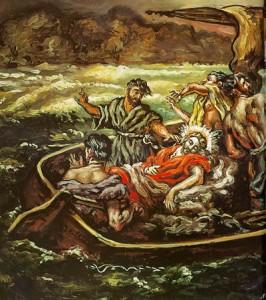
In the Storm
“Do you not yet have faith?” Our Lord’s question in today’s Gospel frames the Sunday liturgies for the remainder of the year, which the Church calls “Ordinary Time.”
In the weeks ahead, the Church’s liturgy will have us journeying with Jesus and His disciples, reliving their experience of His words and deeds, coming to know and believe in Him as they did.
Notice that today’s Psalm almost provides an outline for the Gospel. We sing of sailors caught in a storm; in their desperation, they call to the Lord and He rescues them.
Mark’s Gospel today also intends us to hear a strong echo of the story of the prophet Jonah. He, too, was found asleep on a boat when a life-threatening storm broke out that caused his fellow travelers to pray for deliverance, and then to marvel when the storm abated (see Jonah 1:3-16).
But Jesus is something greater than Jonah (see Matthew 12:41). And Mark wants us to come to see what the apostles saw—that God alone has the power to rebuke the wind and the sea (see Isaiah 50:2; Psalm 18:16). This is the point of today’s First Reading.
If even the wind and sea obey Him, shouldn’t we trust Him in the chaos and storms of our own lives?
As with the apostles, the Lord has asked each of us to cross to the other side, to leave behind our old ways to travel with Him in the little ship of the Church.
In their fear today, they call Him, “Teacher.” And it is only faith in His teaching that can save us from perishing. We should trust in Christ, and like Christ – who was able to sleep through the storm, confident that God was with Him (see Psalm 116:6; Romans 8:31). We should live in thanksgiving for our salvation, as today’s Epistle tells us—as new creations, no longer for ourselves but for Him.
Pope Benedict XVI
Homily, June 21, 2009
We have just heard the Gospel reading of the calming of the storm, which was presented with a brief but incisive passage from the Book of Job, in which God reveals himself as the Lord of the sea. Jesus rebukes the wind and orders the sea to be calm, he speaks to it as if it were identified with the power of the devil. In fact, according to what the First Reading and Psalm 107[106] tell us, in the Bible the sea is considered a threatening, chaotic and potentially destructive element which God the Creator alone can dominate, govern and calm.
Yet, there is another force a positive force that moves the world, capable of transforming and renewing creatures: the power of “Christ’s love” (2 Cor 5: 14) as St Paul calls it in his Second Letter to the Corinthians not, therefore essentially a cosmic force, but rather divine, transcendent. It also acts on the cosmos but, in itself, Christ’s love is “another” power and the Lord manifested this transcendent otherness in his Pasch, in the “holiness” of the “way” he chose to free us from the dominion of evil, as happened for the Exodus when he brought the Jews out of Egypt through the waters of the Red Sea. “Your way, O God, is holy”, the Psalmist exclaims, “Your way was through the sea/ your path through the great waters” (Ps 77[76]: 13, 19). In the Paschal Mystery, Jesus passed through the abyss of death, because in this way God wanted to renew the universe through the death and Resurrection of his Son, who “died for all”, that all might live “for him who for their sake died and was raised” (2 Cor 5: 15), and not live for their own sake alone.
The solemn gesture of calming the stormy sea was a clear sign of Christ’s lordship over negative powers and induces one to think of his divinity: “Who then is this”, his own Disciples asked fearfully, “that even wind and sea obey him?” (Mk 4: 41). Their faith is not yet firm, it is being formed; it is a mingling of fear and trust; on the other hand, Jesus’ confidant abandonment to the Father is total and pure. This is why he could sleep during the storm, completely safe in God’s arms.
